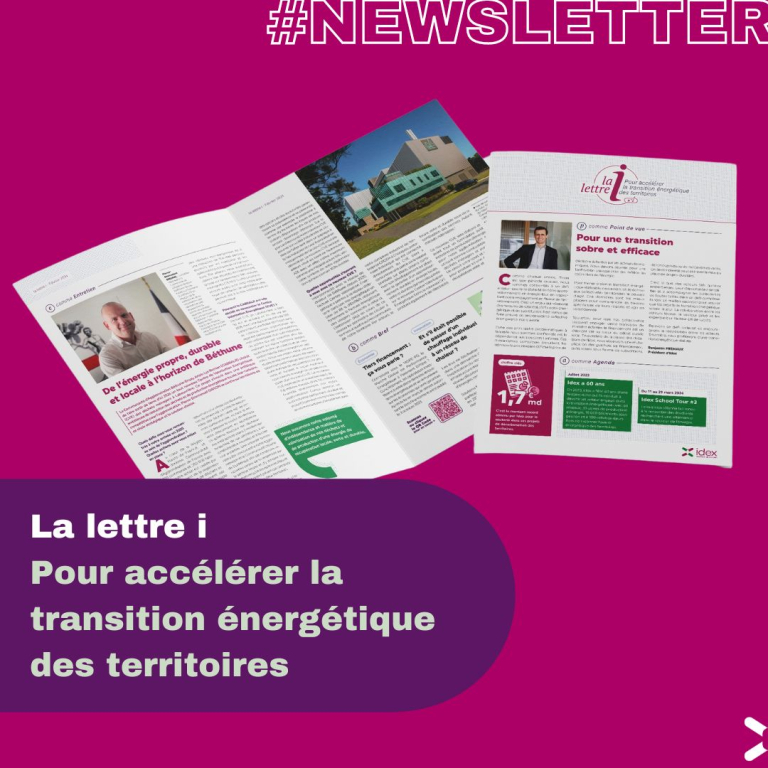Regional energy transition is happening!
The energy transition is crucial for our planet and for future generations as we face the present climate emergency and the need to reduce our dependence on fossil energies. Local energy infrastructure, funded by local authorities and businesses, plays an essential role in this transformation through the adoption of innovative, sustainable solutions. Idex stands out for its overarching approach and its commitment to useful, local, low-carbon energy derived from resources such as household waste, biomass, and geothermal energy. With the launch of its newsletter the letter i, Idex is inviting elected local officials to come together, discuss, and share their expertise on the role of local energy infrastructure in sustainable urban policy.
Inspiring energy transition initiatives
The first issue of the letter i highlights three examples that illustrate the diversity and richness of local initiatives with a focus on energy transition. First, it celebrates the energy transformation in Béthune-Bruay, emphasizing how this local authority successfully recovers energy from 100,000 tonnes of household waste a year, transforming an environmental challenge into an energy opportunity for the region. It also showcases the low-carbon heating network in Bischwiller, explaining how this town opted for a heating network powered by locally sourced wood chips, significantly reducing its carbon footprint while supplying local residents with sustainable, affordable energy.
The issue signs off by highlighting the adoption of corporate PPA (power purchase agreements) as an innovative solution, exploring the ways in which local authorities can use this approach to stabilize their energy bills and actively participate in the financing of renewable energy projects, illustrated with successful real-world case studies. These examples show that energy transition is within everyone’s reach and can inspire other local initiatives, regardless of a region’s size or setting.
What makes local energy infrastructure essential?
Local energy infrastructure is a vitally important part of the transition to sustainable low-carbon energy. It offers compatible and effective solutions to meet current climate challenges and reduce regional carbon footprints.
Above all, local recycling of resources is crucial. By transforming household waste, biomass, and geothermal and solar energy into renewable heat, this infrastructure helps to reduce local dependence on fossil energies and fully harness a region’s energy potential.
The development of heating and cooling networks is another major pillar of this transition. These networks efficiently distribute energy in different forms (heat and cold), making optimal use of local resources. Heating and cooling networks thus help to reduce carbon emissions and improve energy performance in residential and tertiary buildings.
Local energy infrastructure creates a significant environmental and economic impact. By stimulating the use of renewable and recovered energy, they generate significant energy savings and a considerable reduction in CO2 emissions. Additionally, by promoting competitive and stable local energy from mostly renewable sources, this infrastructure strengthens regional energy autonomy, reduces polluting emissions, and boosts the local economy with the creation of relocation-proof jobs.
Local authorities can then build upon this infrastructure to make decisive progress in their energy transition. It constitutes a powerful lever for transformation, capable of meeting environmental challenges while simultaneously supporting local economic growth.
Why subscribe to the Idex newsletter?
Because the letter i from Idex is more than a newsletter – it’s a platform for discussion and knowledge-sharing in support of the energy transition. By bringing together detailed analysis, inspiring accounts, and real-world case studies, it offers a 360-degree panorama of the challenges and solutions of this crucial energy transition.
Each edition explores a diverse range of subjects, from the optimization of heating and cooling networks to energy recovery from waste or energy renovation in buildings. Our newsletter keeps you informed of local-authority initiatives relating to local and low-carbon energy, and provides real-world examples and reproducible implementation models.
With the letter i, the extent of Idex’s expertise becomes clear – the fruit of many years’ experience in the local, low-carbon energy market. You will also benefit from strategic advice and practical recommendations for maximizing the chances of success in your own local energy transition while minimizing your environmental impact. As readers of this publication, you – the agents of energy transition – become part of an engaged, dynamic community working together for a sustainable, responsible, achievable energy future.
Subscribe to the letter i today and join the community of committed stakeholders in the energy transition!

